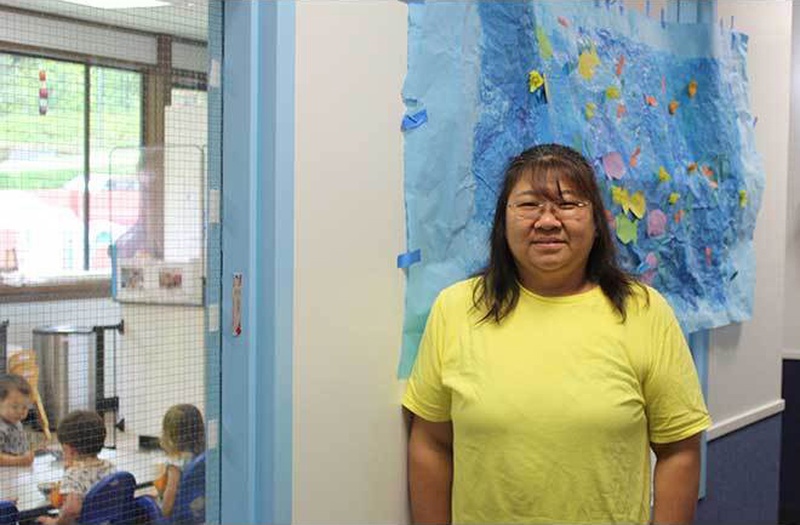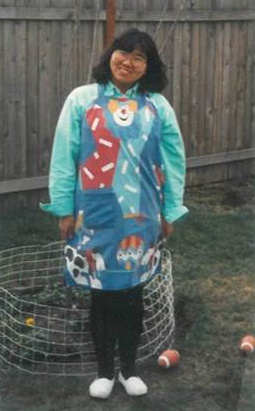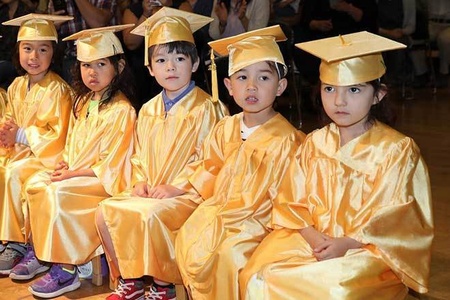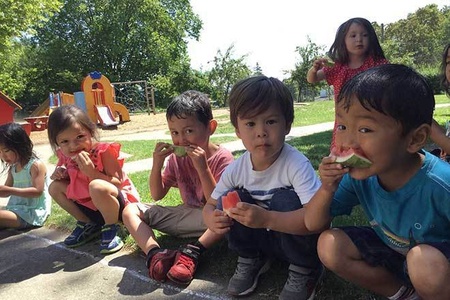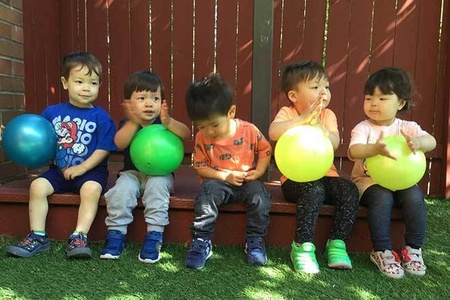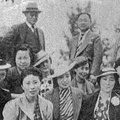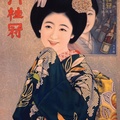I want to create an environment for early childhood education where children can learn Japanese common sense and manners, such as being considerate of others' feelings and respecting elders, as a matter of course.
Yoshimi Suzuki
Moved to Seattle and welcomed by my grandparents
"I came to Seattle at the age of 14 without being able to speak any English, but my first generation Japanese grandparents welcomed me," says Yoshimi Suzuki, principal of Megumi Nursery School. Her lovely smile and quick responses to questions radiate her generous kindness.
When Yoshimi's father left his job as a high school teacher to become the pastor of the Seattle Japanese Baptist Church, she followed him to Seattle with her mother and sister when she was in junior high school. The church was founded in 1899 by the first generation of Japanese Americans, and when Yoshimi first came to Seattle in the 1980s, the older first generation of Japanese Americans were at the heart of the church community. "I was surprised to find that there was a society in America that was more Japanese than Japan. They made me ohagi (rice dumplings) and taught me dance; they were really kind to me."
During high school, he worked part-time as a food server at Kawabe Memorial House, an apartment building for seniors near the church, where he also developed friendships with the first-generation Japanese residents. "Many of the third-generation grandchildren couldn't speak Japanese. They probably didn't have many opportunities to converse in Japanese with a high school student like me. They were very happy to interact with us." Influenced by this, he took lessons in Kokufu-ryu shigin, a rare move for a young person, and even became an apprentice to Miyabe Takamitsu, who was active in Seattle. His encounters with the first-generation Japanese residents would later lead to the founding of Megumi Nursery School.
I want to be able to communicate with my grandchildren from the bottom of my heart through Japanese.
"Since I was little, it was my dream to become a kindergarten teacher," says Yoshimi. In fact, Yoshimi's maternal grandparents ran a Christian kindergarten called Megumi Aijien for many years, and Yoshimi's mother also worked there. Given her family background, it may have been natural for Yoshimi to choose early childhood care without hesitation.
After graduating from Cleveland High School in West Seattle, she went on to study early childhood education at Seattle Central College. She studied early childhood education under the guidance of Japanese-American instructor Shizuko Iida and gained practical experience in childcare. She then founded Megumi Nursery School immediately after graduating from college.
At the time, Yoshimi was only 23 years old. Why did she want to start her own kindergarten? "Through my four years of study and practical experience at university, I began to feel that I wanted to provide childcare that combined the best of Japanese and American education," says Yoshimi. And above all, she wanted to give back to the first generation of Japanese-Americans with whom she had developed relationships at church and Kawabe Memorial House. "I had seen first generation Japanese-Americans unable to converse with their grandchildren in Japanese, and I felt a strong desire to teach Japanese to the next generation. I wanted them to be able to communicate with each other from the bottom of their hearts using the same language."
Seattle's first bilingual Japanese-English nursery school opens
Megumi Nursery School opened in 1992 as Seattle's first bilingual Japanese-English nursery school. First-generation Japanese-Americans immediately visited the school, holding their grandchildren. "The grandmothers from the church came to help out at the open house and treated the attendees to teriyaki chicken. The grandfathers took care of the garden. JEN, a Japanese radio station in Seattle where I worked part-time as a reporter during my university days, gave us a special ad space, so we were able to announce the opening of the nursery school to the Japanese-American community," Yoshimi said. Looking back, she says that it was only thanks to the support from various quarters in the Japanese-American community she was involved with from middle school to university, including the church, Kawabe Memorial House, Kokufu Shigin Association, and JEN.
Yoshimi's vision of "an early childhood education setting where children can naturally learn Japanese common sense and manners, such as being considerate of others' feelings and respecting elders" was born.
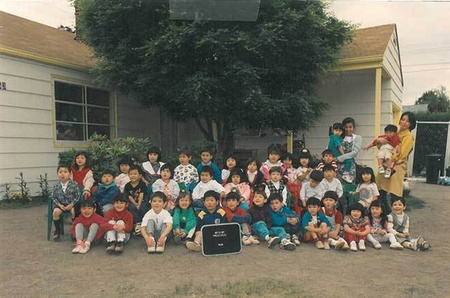
Even so, there were only eight children in the first year. To cover the rent for the small house they rented in Beacon Hill to serve as the campus, and to pay friends who helped out as childcare staff, she also worked part-time at a Japanese restaurant at night. "My father, who is a pastor, taught me that when I came to America, I had to do things for myself, so I managed my own finances, including for my university entrance. Thanks to that, I naturally learned to manage my own finances. My grandmother in Yokohama found out about the launch of the nursery school and lent me 3 million yen, so I worked hard to pay that money back first."
Two years later, Megumi Nursery School was on track to accept 24 children, and has since grown to become the largest Japanese-English bilingual nursery school in the Seattle area, with 122 children at the Bellevue school and 43 at the Seattle school. The first batch of graduating students are now over 30 years old.
When faced with difficulties in life, the love I received while growing up is my strength
"The teachers at the nursery school treat the children as if they were their own children, and spend each day looking forward to watching them grow. When the children graduate, we are filled with gratitude for them, and want to say, 'Thank you for the wonderful time we had.' When they face difficulties in life, I want them to remember how they were raised with so much love at Megumi Nursery School. The deep love they received during their early childhood will surely be a great source of strength," says Yoshimi.
Nowadays, Yoshimi leaves direct contact with the children to her staff, and it is her job to make the hard-working teachers happy. "I try not to just walk in and judge them from one side." On the day of the interview, Yoshimi brought some sweet anmitsu (a type of sweet made from sweet red bean paste) to the staff. The loving relationships between the staff and the children, and between the principal and the staff, are surely what makes Megumi Nursery School so popular.
Megumi Nursery School has many children from families other than Japanese or Japanese-American. This is because many parents are attracted not only to the language aspect of bilingual education in Japanese and English, but also to the educational policy that incorporates Japanese culture and eating habits. The special meals prepared by the three dedicated school lunch staff in the school's kitchen are very popular with the children. The school also has strong ties with the Japanese community, and the children visit the Seattle Keiro elderly care facility to sing Japanese songs, and also invite fellow Japanese-American Manor residents to Megumi Nursery School.
Yoshimi is also a mother of two boys in middle and high school. Outside of work, she is active in the Japanese community, participating in the Seattle Japanese Baptist Church choir and volunteering at the judo dojo her sons attend. Having grown up in a Christian family that has been around for several generations, Yoshimi is likely a caring and people-loving person at heart. This, combined with the strength she has shown since moving to the U.S. at the age of 14 and becoming independent, has steadily shaped her dream of creating an ideal childcare facility for infants and toddlers. As a role model for Japanese women living in America, we can expect to see her continue to shine in the Seattle Japanese community.
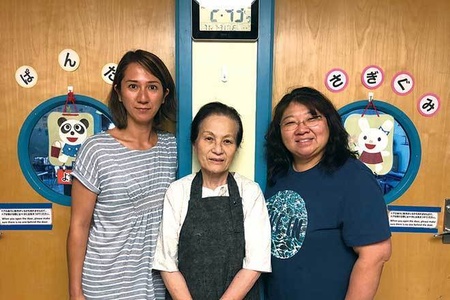
* * * * *
Yoshimi Suzuki : When she was in the second year of junior high school, her father became the pastor of the Seattle Japanese Baptist Church, and her family moved from Yokohama, where she was born and raised, to Seattle. Through church activities and a part-time job at Kawabe Memorial House, she developed close relationships with the first generation of Japanese-Americans in Seattle. After studying early childhood education at Seattle Central College, she founded Megumi Nursery School and served as its principal for 26 years.
* * * * *
Megumi Nursery School
Quality Childcare and Japanese Immersion Early Education
We provide childcare for infants and toddlers with a curriculum that incorporates Japanese language and culture. We provide a place where children can learn important things for living a long life through their experiences, and instead of telling them that "fighting is bad," we encourage them to think about "why it happened," "was there another way," and "what they want to do next" through conflicts with their friends. Under the watchful eye of experienced childcare workers, they repeatedly accumulate small experiences to develop "motivation" and "compassion."
Bellevue Campus
2750 Northup Way, Bellevue, WA 98004
TEL: 425-827-2540
bellevue@megumipreschool.com
Seattle Campus
7054 32nd Ave. S., #101, Seattle, WA 98118
TEL: 206-723-8818
seattle@megumipreschool.com
*This article is reprinted from the North American Newspaper (August 10, 2018).
© 2018 The North American Post / Misa Murohashi


